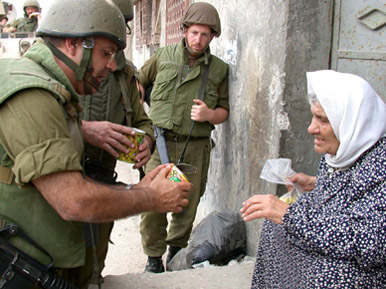UPDATES
Not all doom and gloom in Hebron
March 7, 2014 | Michael Thurin

In a display that would leave anti-Israel proponents seething, Israeli media has captured an incident of Israeli-Palestinian harmony.
The Elder of Ziyon posted the following video on March 4, showing an IDF soldier giving two young Palestinian boys sandwiches in the West Bank town of Hebron. One of the boys spontaneously hugged the soldier and then cheekily replied “shukran” (“thank you” in Arabic) after receiving the gift.
The video comes in stark contrast to Western media’s portrayal of Hebron as territory constantly subjected to Israeli military aggression. An example of such a one-sided and sensationalist presentation was the Feb. 10 report “Stone Cold Justice” from the ABC program 4 Corners, co-produced by The Australian‘s Middle East correspondent John Lyons, which AIJAC has previously criticised.
While the situation in Hebron is obviously tense, this video highlights that the reality on the ground is not the unrelenting violence and confrontation that many think, and that IDF soldiers are perceived positively by at least some locals.
Another example of Israelis and Palestinians existing side-by-side was a video reported by Israeli TV station Channel 2 on Aug. 29 last year. The clip showed IDF soldiers, clad in full military uniform, dancing to Gagnam Style and joining the celebrations at a Palestinian wedding in Hebron.
It was later confirmed that the wedding was for a member of the Palestinian Jabari clan. Led by the moderate Sheikh Zaid al-Jabari, the clan is the most predominant in Hebron. The Sheikh is well know for his pro-Israel stance, and “like many in his family, maintains close contacts in the Israeli coordination office [of the IDF], in an attempt to deal with daily problems,” the Times of Israel reported. Moreover the Sheikh has publicly acknowledged the right of Jews to live in Hebron, and even went as far as to prevent Arab extremists from burning down a local synagogue on Rosh HaShanah in 2011.
It is fair to assume that these are not isolated incidents, but are parts of a greater and more complex narrative that features a variety of factions in Hebron and the rarely reported cooperation between them. One can only hope it continues and receives some of the publicity it deserves.
-Michael Thurin
Tags: Israel





